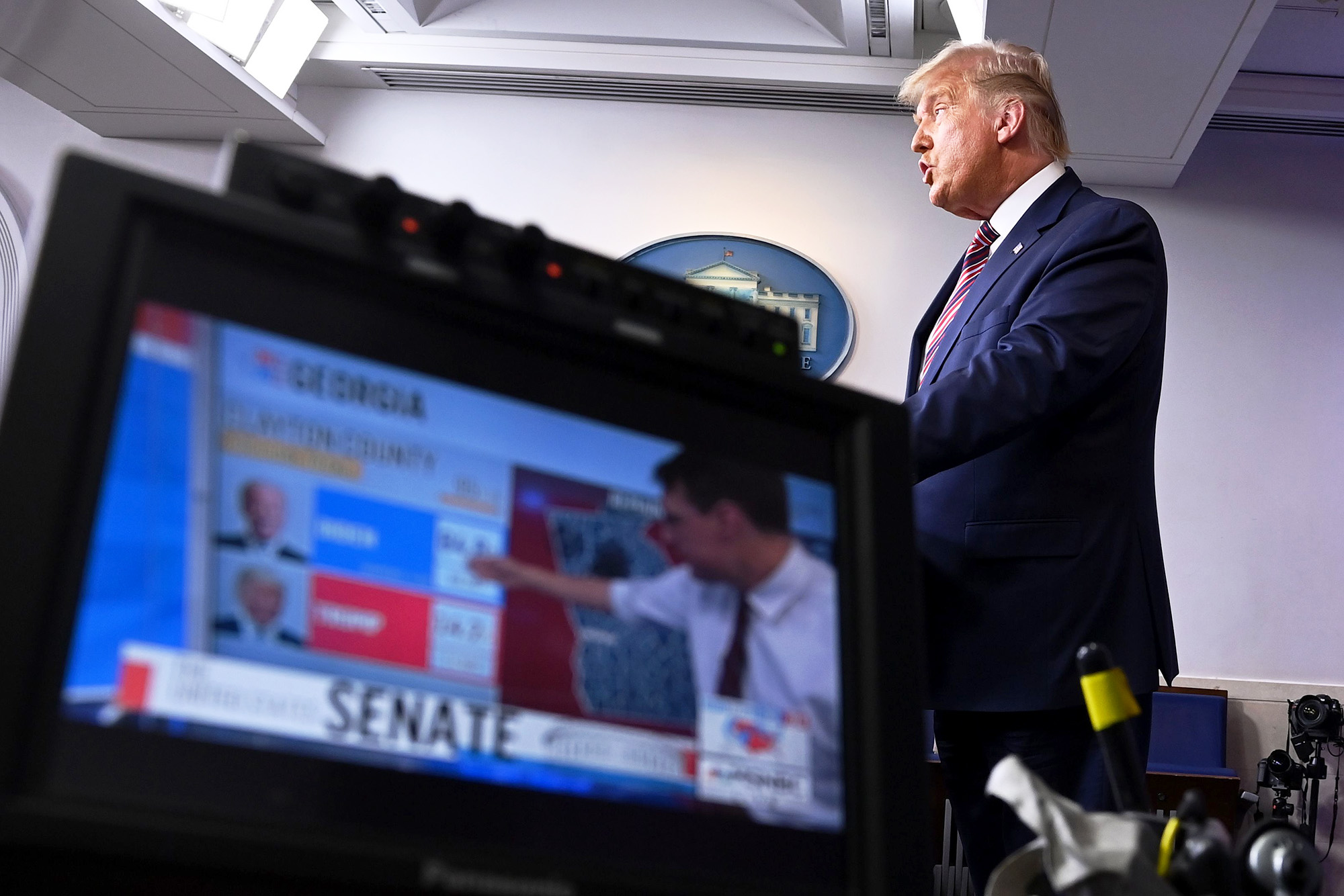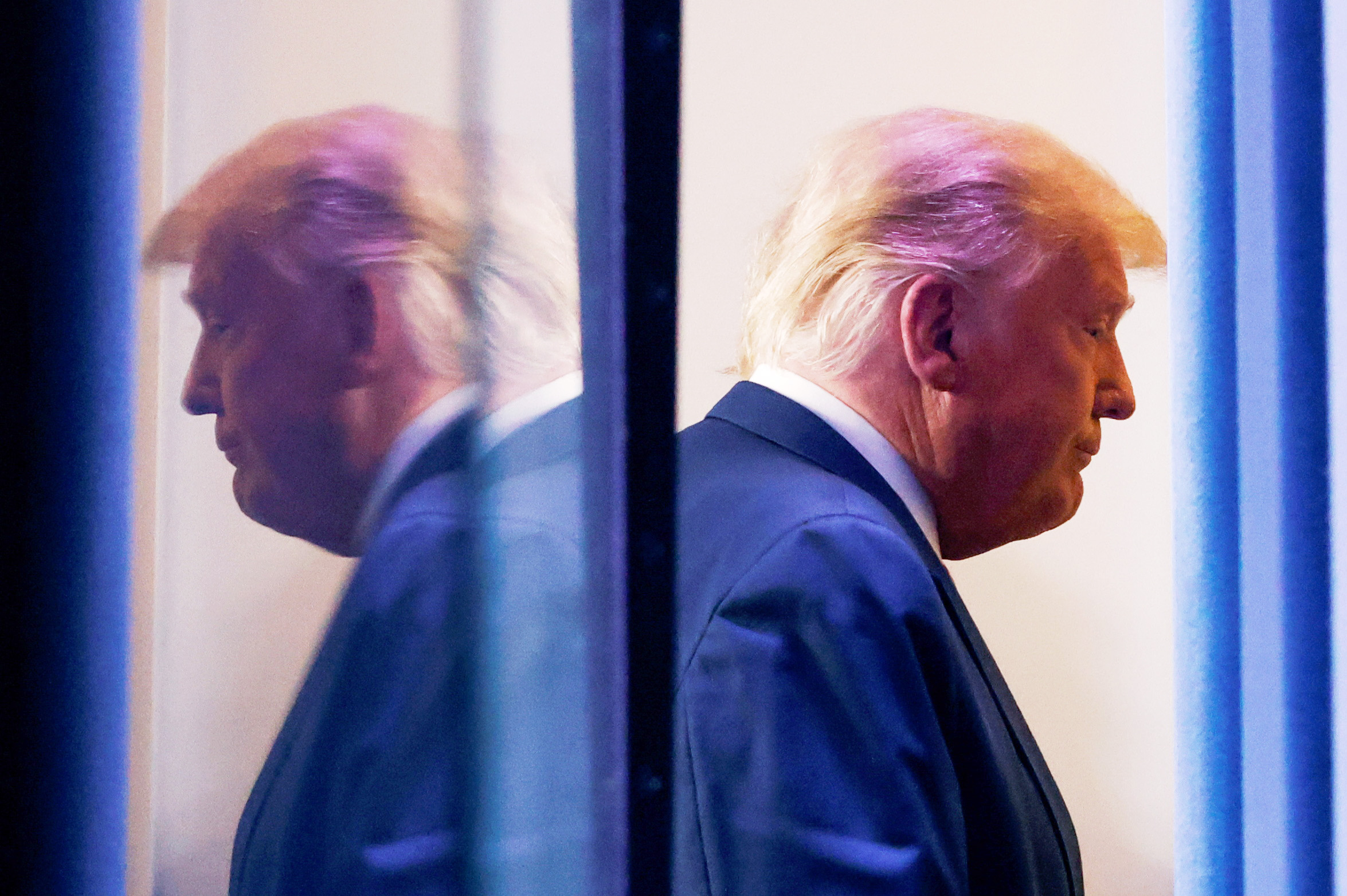5 false or misleading statements Trump made in post-election remarks
The Thursday night remarks from the White House were overwhelmingly false.
When President Donald Trump stepped to the podium in the White House briefing room Thursday evening, he gave a winding and defiant statement, claiming without providing evidence, that the election was being stolen, fraud was being committed and vowing to fight, to the U.S. Supreme Court, if necessary, to protect what he characterized as a victory.
His statements, which echoed those from prior remarks and tweets, drew immediate criticism for his faulty or misleading description of events and the laws and rules surrounding the election.
"A sitting president undermining our political process & questioning the legality of the voices of countless Americans without evidence is not only dangerous & wrong, it undermines the very foundation this nation was built upon," Republican Rep. Will Hurd, of Texas, tweeted. Here are some of the statements that drew objections:
Claim 1: "If you count the legal votes, I easily win. If you count the illegal votes, they can try to steal the election from us."
While the president was not clear about which votes are "legal" and which are "illegal," he has decried mail-in voting for months. It would appear "legal votes," in the opening line of Trump's remarks, refers to ballots cast in-person on Election Day, which tended to favor him. By contrast, he appeared to be implying that mail-in ballots -- which favored Democrat Joe Biden -- were somehow illegal in part because of when they were counted (generally later on, which made his leads evaporate in some key swing states).
Trump has decried mail-in voting for months (although he cast his own ballot by mail this year) and suggested numerous times, without evidence, that the system was susceptible to widespread fraud. Mail-in or absentee voting has been a trusted form of casting a vote for decades, often for military personnel, the elderly or those who are ill, and several states have made the process universal. Experts have repeatedly said fraud is exceedingly rare.

Rick Santorum, the former Republican senator from Pennsylvania, called the president's attempt to invalidate mail-in votes "shocking" and "dangerous."
Speaking on CNN, Santorum said it is "not something the President of the United States should say -- or any elected official should."
The president also said votes that "came in late" should not be counted, but there is no evidence that late-arriving ballots have been improperly added to any state's count. Some states, including North Carolina and Pennsylvania, have approved plans to accept mail-in ballots that are postmarked by election day but arrive late.
The U.S. Supreme Court has, for now, signed off – but justices signaled they could look at the validity of those provisions because they were not invoked by state legislatures, which hold the Constitutional authority over elections. Pennsylvania officials said that they have segregated late-arriving ballots and have not yet counted them.
Claim 2: "There's tremendous litigation going on and this is a case where they are trying to steal an election. They are trying to rig an election and we can't let that happen."
Chris Christie, a Republican and close adviser to the president, objected to Trump's assertion that the election is being rigged: "As a prosecutor, that's like asking me to indict someone without showing me any evidence," he said during a special report on ABC, where he is a contributor, Thursday evening. "We heard nothing today about the evidence."
The president's campaign has taken its grievances to court, filing at least six lawsuits across four states.
So far, Trump's campaign has seen little success as they struggled to identify substantial instances of fraud to support those legal claims. A judge in Georgia on Thursday dismissed the campaign's suit there for lack of evidence, and a judge in Michigan rejected another suit there after noting it was based on hearsay "at best."
Trump suggested during the campaign that the only way he would lose is if the election were rigged and made similar unsubstantiated claims during the 2016 race -- a contest that he won.

Claim 3: "There are now only a few states yet to be decided in the presidential race. The voting apparatus of those states are run in all cases by Democrats."
At the time of the president's remarks there were five swing states -- Pennsylvania, Arizona, Nevada, North Carolina, and Georgia -- that had not yet been projected by ABC News for one candidate or the other. Two were led by Republican governors and one, Georgia, has a Republican secretary of state, Brad Raffensperger. Raffensperger was endorsed by Trump ahead of his election last year, has repeatedly reassured the public that the election would be safe, fair and accurate.
"We will get it right, and we'll defend the integrity of our elections," Raffensperger said.
Gabriel Sterling, the manager overseeing voting systems in Georgia, said on Friday that officials in Georgia were "not seeing any widespread irregularities," and assured the public his office would investigate "any credible accusation with any real evidence behind it."
"We are committed to doing anything and everything to maintaining trust in our elections process for every Georgian, regardless of partisan preference," Sterling said.
Claim 4: "In Michigan, we were way up in Michigan, won the state and in Wisconsin we did likewise, fantastically well. And that got whittled down. In every case it got whittled down."
The president never "won" Michigan or Wisconsin at any point during the election. Rather, he held an early lead in numerous states as they began counting in-person votes on Tuesday.
The president's lead shrunk as mail-in-ballots, used overwhelmingly by Democrats amid the pandemic, were counted in the hours and days after polls closed. Mail-in-ballots take significantly longer to count than in person-votes do, and many states saved them for last.
As of Friday, Biden led the president by nearly 150,000 votes in Michigan and over 20,000 votes in Wisconsin. ABC News has projected Michigan for Biden and said the former vice president is the "apparent winner" of Wisconsin.
States are not won or lost until the vote is certified, which happens several days or even weeks after Election Day.
Claim 5: "We went to court in a couple of instances, and we were able to get the observers put in. And when the observers got there, they wanted them 60, 70 feet away, 80 feet, 100 feet away or outside the building to observe people inside the building."
Observers were allowed into the Philadelphia counting facility from the beginning. Both campaigns are permitted to watch ballot processing to ensure that everything is being done properly -- including checking that the ballots arrive in required "secrecy envelopes" and the voter's signature matches the one on file.
By the estimates of the Trump campaign's own attorneys, observers watched from locations that were 15 to 18 feet from the tables where mail-in ballots were being opened and processed. Live cameras also recorded the entire room.
Elections officials said they needed to provide a buffer between the poll workers and the observers to ensure social distancing and protect the health and safety of all involved. They argued the position allowed observers a vantage point to "see these workers take ballot envelopes out of one tray, look at the back of the envelope where the declaration is located, and then either place them in a different tray or back in the initial tray."
The Trump campaign sued alleging that their observers could not see enough from that distance. The judge issued an order permitting observers to move closer, so long as they wore masks and took other health precautions. Biden campaign officials did not object to the decision, and while local elections officials appealed the matter to the State Supreme Court, the Democrats did not join it.
"We don't care if your observers are 18 feet away or 15 feet away or 6 feet away -- as long as election officials can do their jobs," one Biden official tweeted Thursday," tweeted Biden spokesman Bill Russo.




